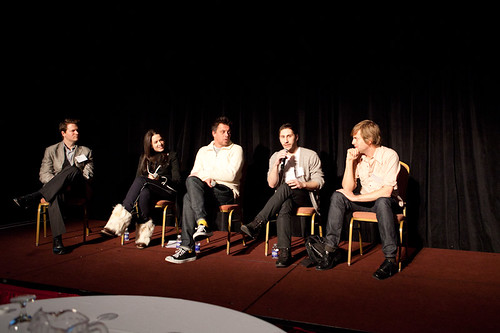Debbie Stier speaking at BookExpo America 2009
Debbie Stier (@debbiestier) first came across my radar when HarperStudio was born… A book publishing outlet that made sense in the 21st century! Publishers who understood (or wanted to understand) the digital migration. Unfortunately bravery and vision weren’t sufficient, and HarperStudio was recycled. (Read the HarperCollins explanation memo to employees.) I was disappointed that the project was abbreviated, but proud of HarperCollins for taking the risk in the first place.
One of her homeruns with HarperStudio was Crush It! by Gary Vaynerchukwhich I’ve “read” three times (the print edition, the audio edition and the Vook edition) as much for Vaynerchuk’s energy, self-confidence and optimism as for the opportunity to compare assets distinct to each platform. I imagine Vaynerchuk has been a good fit for Publishing’s Optimist Prime. In an interview with Marian Schembari last June Stier conveyed unabashed enthusiasm for the future of publishing.
by Gary Vaynerchukwhich I’ve “read” three times (the print edition, the audio edition and the Vook edition) as much for Vaynerchuk’s energy, self-confidence and optimism as for the opportunity to compare assets distinct to each platform. I imagine Vaynerchuk has been a good fit for Publishing’s Optimist Prime. In an interview with Marian Schembari last June Stier conveyed unabashed enthusiasm for the future of publishing.
“I love that word-of-mouth is scalable. I love that anybody can share, and connect, and spread the word about great books and ideas without ever having to get permission… I’m allergic to bureaucracy. Publishing is full of protocols; I find it frustrating when people see their role as putting up barriers and looking for problems. I’d rather make something great happen… It’s liberating to know that you are in control of your own destiny and don’t have to hope that the gatekeepers allow you to be recognized.” (Digital Book World)
Stier’s perspective has encouraged and reassured me during my foray into the book publishing jungle. And it’s not all bluster and bravado. Stier’s track record speaks for itself. And she’s EVERYwhere! (I have a hunch that she may secretly have invented the social web between book launches.) The other day I was speaking to my wife’s cousin, Cali Williams Yost (@caliyost) about her experience publishing Work + Life and now working on her second book, and Stier’s name inevitably popped up: “She is wonderful and amazing!” Scanning some of the titles Stier has worked on I realized that my mother-in-law’s friend, Dotty Frank, has also been touched by Stier. The Stier Factor! And when I registered to attend MediaBistro‘s eBook Summit I discovered that she was slated to be one of the panelists. (Did I mention that Debbie Stier is EVERYwhere?)
and now working on her second book, and Stier’s name inevitably popped up: “She is wonderful and amazing!” Scanning some of the titles Stier has worked on I realized that my mother-in-law’s friend, Dotty Frank, has also been touched by Stier. The Stier Factor! And when I registered to attend MediaBistro‘s eBook Summit I discovered that she was slated to be one of the panelists. (Did I mention that Debbie Stier is EVERYwhere?)
During her eBook Summit presentation she announced that she’s departed HarperCollins, and that she hasn’t yet announced her next plan. She did mention that it is somewhat unrelated to book publishing but will draw upon her publishing experience. Hmmm… Perhaps something to do with the SATs?
As for promotion strategies in the publishing industry Stier articulated in no uncertain terms that
“everybody should have a digital presence… You’ve got to be part of it to understand, or else you’re not feeling the culture of it.”
She also skimmed over relevant tech/communication trends that she sees emerging. Mobile, mobile, mobile. There’s an adavantage to early adopters. If you use an iPhone, try out Instagram. In publishing, she explained, mobile strategy is mostly tied to apps (location-based and otherwise), etc. In other industries texting and QR codes are making major inroads, but publishing lags behind! This is an opportunity. First mover advantage. She touched on Foursquare and mused on behaviour changes like the gym rat badge. If you are writing nonfiction, Stier said, think of ways that FourSquare could overlap. Tips are key! And many other smart uses too. Leave breadcrumbs where you wrote the book, ate a meal, had a drink, etc.
Stier also emphasized the importance of “caring”. Adopt the Zappos strategy as DELL has recently learned. Care. Gary Vaynerchuck’s new book, The Thank You Economy, is precisely about this. In only a few short minutes Debbie Stier had nailed it. Boom, boom, boom.
Unfortunately she had to depart earlier than anticipated and we didn’t connect aside from a few tweets and this sad image but kind message on Tumbler. Soon, I hope, to meet the legendary Debbier Stier in person.
Like this:
Like Loading...





